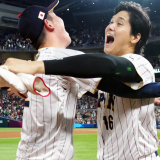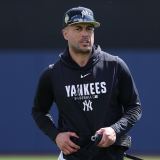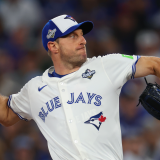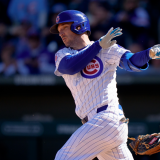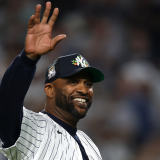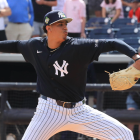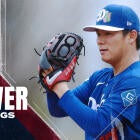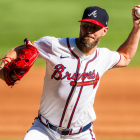2018 World Series prediction, Red Sox-Dodgers tale of the tape: Why the two storied franchises are so evenly matched
The Red Sox and Dodgers are two of MLB's most storied franchises, and we could be in for an all-timer
Two rousing series victories, two dramatically different paths to get there.
The Red Sox came into the American League Championship Series as one of the most lightly-regarded 108-win teams in baseball history, as pundits (myself included!) jumped on the Astros as favorites to win. After getting throttled by Justin Verlander and Houston's offense in Game 1, Boston roared back, winning four straight and knocking out the defending champs. With a deep lineup and great defense, the Sox showed their doubters how those 108 wins came to be.
Meanwhile the Dodgers needed all seven games to decide the National League Championship Series against the Brewers. L.A. beat back all kinds of twists from Milwaukee, including ultra-aggressive bullpen use that saw the Brewers' starter pulled after just one batter in Game 5. In the end, the Dodgers needed multiple heroes to prevail. Super utilityman Chris Taylor's incredible robbery of Christian Yelich, Yasiel Puig's batfliptastic three-run bomb and a bullpen bolstered by practically the entire Dodgers rotation ended Milwaukee's World Series dreams.
The resulting battle between two of baseball's most storied franchises could be a great one.
Lineups
- Red Sox offense: 110 wRC+* (t-2nd in AL)
- Dodgers offense: 118 wRC+ (1st in NL)
- Red Sox defense: -26 Defensive Runs Saved (12th in AL)
- Dodgers defense: 47 Defensive Runs Saved (5th in NL)
*wRC+ refers to Runs Created Plus, a stat that compares each team's offense to league average, with average being 100. (A score of 118 would thus be 18% better than league average, and 110 would be 10% better.) We've stripped out pitcher hitting for this version of wRC+, since managers Alex Cora and Dave Roberts are likely to have quicker hooks than usual, meaning we might rarely see a team's pitchers bat more than once during games held at Dodger Stadium.
After tossing all these fancy stats at you, we're going to do something blasphemous: Invoke Runs Batted In. The Dodgers' top RBI man was Matt Kemp, who knocked in 85. No other Dodger topped 80. Given that the Dodgers rated as the best offense in all of baseball by park-adjusted offense, that's a really weird stat.
It's also an encouraging one, if you're trying to build a great playoff roster. The Dodgers' lack of huge counting stat guys points to an aggressive share-the-wealth philosophy, rather than a lack of talent. Half the lineup has been subject to platoons during the postseason; put another way, eight of L.A.'s 13 position players are part of timeshares. That depth and versatility enabled the Dodgers to overcome Craig Counsell's pull-the-starter-after-five-pitches shenanigans, and can help L.A. navigate Boston's more conventional pitcher usage.
Boston carries more elite talent on its roster, which negates the need for constant platoons. Mookie Betts, the likely AL MVP who's capable of winning games with his bat, legs, or glove at any given moment, is the best player on either team. He's also the most intriguing player of this series, given how Boston's lineup shakes out: With the DH eliminated for games at Dodger Stadium and middle-of-the-lineup masher/most-of-the-time DH J.D. Martinez needing to play, Betts will likely start at second base in L.A. It's a position he's manned in just one regular-season game since 2014, though his athleticism and short-lived but clean track record at the position could allow him to fare well there anyway.
It's hard to imagine Betts faring worse than the mishmash of players that contributed to a negative-17 rating at second this season, per Baseball Info Solutions' Defensive Runs Saved. The Sox were the worst team in the league at the combined second base/shortstop/third base positions this year, faring 59 runs worse than average, per that same stat.
Two other X-factors we're watching in this series are young outfielders Cody Bellinger and Andrew Benintendi.
Bellinger took an 0-fer for the entire NLDS, while also looking occasionally shaky in the field. Bellinger's numbers didn't exactly skyrocket in the NLCS, as the Dodgers outfielder went just 5-for-25 for the series. But he took home NLCS MVP honors anyway, on the strength of timing. Without his 10th-inning acrobatic catch and walkoff single in Game 4 and his two-run homer in Game 7, the Dodgers might be playing golf right now. Bellinger posted an OPS 200 points higher against right-handed pitchers than lefties this year, so he'll likely be one of the players who gets protected by Roberts and that deep bench.
Benintendi's aggregate numbers aren't all that impressive this October either, with the 22-year-old left fielder going 9-for-38 with no homers in the first two rounds of the playoffs. But his game-saving, walkoff catch in Game 4 of the ALCS is the most indelible highlight of this entire postseason. That catch exemplified how Benintendi is a multi-tooled threat like Betts, athletic and capable of helping his team in multiple ways. He's another player with a wide platoon split this year (.305/.387/.490 against righties, .247/.301/.393 against lefties), but one who won't get the benefit of a timeshare. The Dodgers will start multiple tough left-handers in this series, so Benintendi's ability to hang tough against Clayton Kershaw and company could tell us a lot about the outcome of this series.
Pitchers
Red Sox rotation: 84 ERA* (3rd in AL), 91 FIP** (4th in AL), 25.4% K rate (4th in AL)
Dodgers rotation: 83 ERA (1st in NL), 85 FIP (1st in NL), 25.7% K rate (1st in NL)
Red Sox bullpen: 84 ERA-* (4th in AL), 92 FIP-** (3rd in AL), 25.1% K rate (3rd in AL)
Dodgers bullpen: 97 ERA- (5th in AL), 97 FIP- (8th in NL), 25.7% (3rd in NL)
*ERA -- refers to park-adjusted ERA. A score of 100 is league average, meaning a score of 84 is 16% better than league average.
**FIP -- refers to park-adjusted fielding-independent pitching. This stat focuses on the factors a pitcher can best control, such as strikeout rate, walk rate, and home-run rate, and strips out the effects of defense and luck. It runs along the same scale as ERA-.
If you've got a read on how the top starters for the Red Sox and Dodgers will fare in the World Series, get off the internet, open a sports-handicapping business, then retire in a year.
In Boston, Chris Sale hasn't been his consistent, ace-like self since the summer. A late-season shoulder injury knocked him onto the disabled list, and his recovery consisted of abbreviated, sometimes rocky showings thereafter. Then after looking better in the ALDS, he lasted just four innings in Game 1 of the ALCS and was then forced to miss his scheduled Game 5 start with a nasty stomach ailment. That illness is now reportedly behind him, but it's been so long since we've seen the dominating version of Sale that it's hard to know what we might get in this series. Sale's velocity has fallen four or five ticks from his 97-98 peak earlier this season, offering a more tangible source of concern.
If Sale is a question mark, David Price is a full-blown enigma. Price was 0 for his 10-year career in the postseason heading into this year's playoffs, having fared well as a reliever but struggled mightily as a starter. He found redemption in Game 5 of the ALCS, firing six transcendent innings of nine-strikeout, no-walk, three-hit shutout ball, in the process outdueling Justin Verlander, punching Boston's ticket to the World Series, and exorcising at least some of his playoff demons. But like Sale, Price doesn't throw as hard as he once did, and in his case that's been a long-term trend, not a potentially reversible pulback caused by short-term factors. A pitcher who throws fastballs almost exclusively and sits at 93 (instead of 95-96) might be hittable for an elite offense, Price's Game 5 gem notwithstanding.
Kershaw's own postseason narrative has been even more scrutinized, and with good reason. Last week, I wrote about Kershaw's shrinking margin for error, and how he too had been victimized by a sharp dip in velocity, meaning that any corresponding drop in command could lead to rough times, which is what happened in Game 1 of the NLCS. Kershaw immediately bounced back, looking like his old self in both his Game 5 start and Game 7 closeout performance against the Brewers, alleviating some concerns. If Sale and Price pitch well and Kershaw doesn't, the Sox will cruise through this series. If the opposite occurs, the supposedly overmatched Dodgers could be a tough out.
As for the relievers on both squads, it's a misnomer to even think in terms of starting pitcher vs. relief pitcher differentiators. The Dodgers used Kershaw and converted starter Julio Urias in the pen in Game 7 of the NLCS, and also shuttled Alex Wood, Rich Hill and Kenta Maeda -- all usually starters during the regular season -- into relief duty. The Dodgers' depth, combined with the multiple days afforded by the playoff schedule, give L.A. the ability to paper over its lack of bullpen star power outside of Kenley Jansen.
For Boston, keep an eye on right-handers Matt Barnes and Craig Kimbrel. Barnes has been ridden hard this postseason, appearing in every game during the ALCS; his ability to stay fresh and effective will be vital for the Sox's success. Likewise, Kimbrel needs to avoid the command issues that caused him to load the bases and nearly blow Game 5 of the ALCS, since he can't rely on diving catches to bail him out if it happens again.
The pick
I don't see this as nearly as big a mismatch as my CBS Sports colleagues do. Despite the huge gap in regular-season records, the Dodgers were an excellent club by multiple measures. They led the majors in park-adjusted offense, fared better by advanced defensive metrics than the Red Sox did, and saw their starting pitchers outpace Boston's in park-adjusted ERA, park-adjusted defense-independent pitching, and strikeout rate. Moreover, the Dodgers took great care in building out their 25-man roster, with the ability to throw a stable full of potent left- and right-handed hitters at opponents.
Finally, you can throw regular-season records out the window for many reasons, not the least of which is this: The Dodgers scored 194 more runs than they allowed this season, and run differential is often a better indicator of a team's quality than mere wins and losses; extrapolate each team's run different over 162 games, and the Sox rated as just two wins better than L.A. during the regular season, rather than the 16-win gap that raw records showed.
I still like Boston's young Killer B's to prevail, because the Sox have just a bit more top-line talent. But it'll be a close, really fun series, with the potential to be an all-timer. Red Sox in 7.


